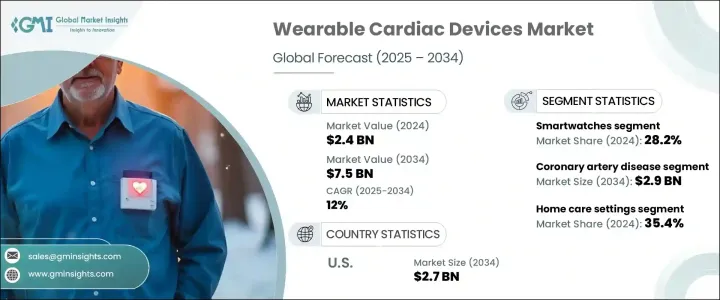
|
시장보고서
상품코드
1699260
웨어러블 심장 장치 시장 - 기회, 성장 촉진요인, 산업 동향 분석, 예측(2025-2034년)Wearable Cardiac Devices Market Opportunity, Growth Drivers, Industry Trend Analysis, and Forecast 2025-2034 |
||||||
세계의 웨어러블 심장 장치 시장은 2024년 24억 달러로 평가되었으며, 2025년부터 2034년까지 연평균 복합 성장률(CAGR) 12%로 확대될 것으로 예상됩니다.
이러한 휴대형 의료장치는 개인이 심장의 건강을 매일 모니터링하고, 심박수, 리듬, 신체 활동, 수면 패턴에 근거한 장기적인 데이터를 수집 및 분석하는 것을 가능하게 합니다. 첨단 센서와 AI를 활용한 분석기기를 갖춘 이러한 장치들은 실시간으로 통찰을 제공하여 건강관리 전문가가 충분한 정보를 바탕으로 의사결정을 할 수 있도록 지원합니다. 예방 헬스케어에 대한 의식 상승, 심혈관 질환 환자수 증가, 환자의 원격 모니터링에 대한 수요 증가는 시장 성장의 원동력이 되고 있습니다.

시장은 제품별로 스마트 워치, 홀터 모니터, 패치, 산소포화도 측정기, 제세동기, 기타 웨어러블 디바이스로 구분됩니다. 사용자 친화적인 디자인은 전문가의 도움 없이 원활하게 건강 추적을 가능하게 하고, 폭넓은 사람들이 접근할 수 있도록 합니다. AI를 탑재한 알고리즘은 불규칙한 심장 리듬을 검출해, 실시간으로 건강 통찰을 제공하는데 도움이 됩니다.
| 시장 범위 | |
|---|---|
| 시작 연도 | 2024년 |
| 예측 연도 | 2025-2034년 |
| 시작 금액 | 24억 달러 |
| 예측 금액 | 75억 달러 |
| CAGR | 12% |
용도별로는 관상동맥질환, 심근증, 심근경색 후 선천성 심장질환, 수술후 심장케어, 기타 관련질환으로 나뉘어집니다. 운동부족, 비만, 흡연과 같은 라이프 스타일과 관련된 위험 요소의 급증은 이 부문에서 웨어러블 심장 장비 수요를 촉진하고 있습니다.
시장은 또한 최종 용도별로 병원, 전문센터, 재택 관리 환경 및 기타 시설로 분류됩니다. 쾌적한 환경에서 지속적인 심장 모니터링에 대한 선호도가 증가함에 따라 2024년 재택 관리 환경의 점유율은 35.4%였습니다. 이 장치는 개인이 집에서 심장혈관계의 건강 상태를 추적할 수 있게 하고 건강 관리 시설에 대한 의존도를 완화합니다. 규정 준수는 포인트 오브 케어 설정에서 웨어러블 디바이스의 효율성을 보장하고 이 부문의 채택을 더욱 촉진합니다.
지역별로 미국의 웨어러블 심장 장치 시장은 심혈관 질환의 높은 유병률과 발달한 헬스케어 시스템에 힘입어 2034년까지 27억 달러에 달할 것으로 예측되고 있습니다. 소비자 의식 증가와 웨어러블 건강 장비의 기술적 진보는 시장 성장을 더욱 강화하고 있습니다.
목차
제1장 조사 방법과 조사 범위
제2장 주요 요약
제3장 업계 인사이트
- 생태계 분석
- 업계에 미치는 영향요인
- 성장 촉진요인
- 심혈관 질환을 앓고 있는 환자 증가
- 웨어러블 심장 장치의 급속한 기술 진보
- 저침습 장치 기호의 고조
- 건강 의식의 고조와 예방 의료
- 업계의 잠재적 위험 및 과제
- 데이터 프라이버시 문제
- 엄격한 규제 정책
- 성장 촉진요인
- 성장 가능성 분석
- 규제 상황
- 기술적 전망
- 향후 시장 동향
- Porter's Five Forces 분석
- PESTEL 분석
제4장 경쟁 구도
- 소개
- 기업 점유율 분석
- 기업 매트릭스 분석
- 주요 시장 기업의 경쟁 분석
- 경쟁 포지셔닝 매트릭스
- 전략 대시보드
제5장 시장 추계 및 예측 : 제품별, 2021-2034년
- 주요 동향
- 홀터 모니터
- 스마트 워치
- 패치
- 제세동기
- 산소포화도 측정기
- 기타 제품
제6장 시장 추계 및 예측 : 용도별, 2021-2034년
- 주요 동향
- 관상동맥질환(CAD)
- 심근증
- 심근경색 이후
- 선천성 심장병
- 심장 수술 후 케어
- 기타 용도
제7장 시장 추계 및 예측 : 최종 용도별, 2021-2034년
- 주요 동향
- 병원
- 전문센터
- 재택치료
- 기타 최종 용도
제8장 시장 추계 및 예측 : 지역별, 2021-2034년
- 주요 동향
- 북미
- 미국
- 캐나다
- 유럽
- 독일
- 영국
- 프랑스
- 스페인
- 이탈리아
- 네덜란드
- 아시아태평양
- 중국
- 일본
- 인도
- 호주
- 한국
- 라틴아메리카
- 브라질
- 멕시코
- 아르헨티나
- 중동 및 아프리카
- 남아프리카
- 사우디아라비아
- 아랍에미리트(UAE)
제9장 기업 프로파일
- Abbott Laboratories
- Boston Scientific
- Cardiac Insight
- CardiacSense
- Cardiac Rhythm
- iRhythm Technologies
- Integra LifeSciences
- Koninklijke Philips
- Medtronic
- Proteus Digital Health
- Qardio
- ZOLL Medical Corporation
- Welch Allyn
- VitalConnect
- Zimmer Biomet
The Global Wearable Cardiac Devices Market was valued at USD 2.4 billion in 2024 and is expected to expand at a CAGR of 12% from 2025 to 2034. These portable medical devices allow individuals to monitor their heart health daily, collecting and analyzing long-term data based on heart rate, rhythm, physical activity, and sleep patterns. By enabling remote monitoring, they eliminate the need for frequent clinical visits, improving patient convenience and medical efficiency. Equipped with advanced sensors and AI-powered analytics, these devices provide real-time insights, helping healthcare professionals make informed decisions. Growing awareness about preventive healthcare, rising cases of cardiovascular diseases, and increasing demand for remote patient monitoring are driving market growth. Wearable cardiac devices are widely used for cardiac arrhythmia monitoring and managing conditions such as heart failure and peripheral artery disease.

The market is segmented by product into smartwatches, Holter monitors, patches, pulse oximeters, defibrillators, and other wearable devices. Smartwatches led the segment, capturing 28.2% of total revenue in 2024. Their user-friendly design allows seamless heart health tracking without professional assistance, making them accessible to a broad audience. AI-powered algorithms help detect irregular heart rhythms and provide real-time health insights. As these watches monitor various vitals, including ECG, heart rate, and oxygen levels, they offer a comprehensive view of cardiovascular health.
| Market Scope | |
|---|---|
| Start Year | 2024 |
| Forecast Year | 2025-2034 |
| Start Value | $2.4 Billion |
| Forecast Value | $7.5 Billion |
| CAGR | 12% |
By application, the market is divided into coronary artery disease, cardiomyopathies, post-myocardial infarction, congenital heart diseases, post-surgical cardiac care, and other related conditions. The coronary artery disease segment held a 37.4% market share in 2024 and is projected to reach USD 2.9 billion by 2034. A surge in lifestyle-related risk factors such as physical inactivity, obesity, and smoking is fueling the demand for wearable cardiac devices in this segment. With rising cases of coronary artery disease, healthcare providers are increasingly relying on wearable technology for early detection and disease management.
The market is further categorized by end use into hospitals, specialty centers, home care settings, and other facilities. Home care settings accounted for a 35.4% share in 2024, reflecting a growing preference for continuous heart monitoring in comfortable environments. These devices enable individuals to track their cardiovascular health at home, reducing dependency on healthcare facilities. Regulatory compliance ensures the effectiveness of wearable devices in point-of-care settings, further driving adoption in this segment.
Regionally, the U.S. wearable cardiac devices market is anticipated to reach USD 2.7 billion by 2034, fueled by a high prevalence of cardiovascular diseases and a well-developed healthcare system. Increasing consumer awareness and technological advancements in wearable health devices are further strengthening market growth.
Table of Contents
Chapter 1 Methodology and Scope
- 1.1 Market scope and definitions
- 1.2 Research design
- 1.2.1 Research approach
- 1.2.2 Data collection methods
- 1.3 Base estimates and calculations
- 1.3.1 Base year calculation
- 1.3.2 Key trends for market estimation
- 1.4 Forecast model
- 1.5 Primary research and validation
- 1.5.1 Primary sources
- 1.5.2 Data mining sources
Chapter 2 Executive Summary
- 2.1 Industry 3600 synopsis
Chapter 3 Industry Insights
- 3.1 Industry ecosystem analysis
- 3.2 Industry impact forces
- 3.2.1 Growth drivers
- 3.2.1.1 Increasing number of patients suffering from cardiovascular diseases
- 3.2.1.2 Rapid technological advancements in wearable cardiac devices
- 3.2.1.3 Growing preference of minimally invasive devices
- 3.2.1.4 Rising health consciousness and preventive care
- 3.2.2 Industry pitfalls and challenges
- 3.2.2.1 Data privacy issues
- 3.2.2.2 Stringent regulatory policies
- 3.2.1 Growth drivers
- 3.3 Growth potential analysis
- 3.4 Regulatory landscape
- 3.5 Technological landscape
- 3.6 Future market trends
- 3.7 Porter's analysis
- 3.8 PESTEL analysis
Chapter 4 Competitive Landscape, 2024
- 4.1 Introduction
- 4.2 Company market share analysis
- 4.3 Company matrix analysis
- 4.4 Competitive analysis of major market players
- 4.5 Competitive positioning matrix
- 4.6 Strategy dashboard
Chapter 5 Market Estimates and Forecast, By Product, 2021 – 2034 ($ Mn)
- 5.1 Key trends
- 5.2 Holter monitors
- 5.3 Smartwatches
- 5.4 Patch
- 5.5 Defibrillators
- 5.6 Pulse oximeters
- 5.7 Other products
Chapter 6 Market Estimates and Forecast, By Application, 2021 – 2034 ($ Mn)
- 6.1 Key trends
- 6.2 Coronary artery disease (CAD)
- 6.3 Cardiomyopathies
- 6.4 Post-myocardial infarction
- 6.5 Congenital heart diseases
- 6.6 Post-surgical cardiac care
- 6.7 Other applications
Chapter 7 Market Estimates and Forecast, By End Use, 2021 – 2034 ($ Mn)
- 7.1 Key trends
- 7.2 Hospitals
- 7.3 Specialty centers
- 7.4 Home care settings
- 7.5 Other end use
Chapter 8 Market Estimates and Forecast, By Region, 2021 – 2034 ($ Mn)
- 8.1 Key trends
- 8.2 North America
- 8.2.1 U.S.
- 8.2.2 Canada
- 8.3 Europe
- 8.3.1 Germany
- 8.3.2 UK
- 8.3.3 France
- 8.3.4 Spain
- 8.3.5 Italy
- 8.3.6 Netherlands
- 8.4 Asia Pacific
- 8.4.1 China
- 8.4.2 Japan
- 8.4.3 India
- 8.4.4 Australia
- 8.4.5 South Korea
- 8.5 Latin America
- 8.5.1 Brazil
- 8.5.2 Mexico
- 8.5.3 Argentina
- 8.6 Middle East and Africa
- 8.6.1 South Africa
- 8.6.2 Saudi Arabia
- 8.6.3 UAE
Chapter 9 Company Profiles
- 9.1 Abbott Laboratories
- 9.2 Boston Scientific
- 9.3 Cardiac Insight
- 9.4 CardiacSense
- 9.5 Cardiac Rhythm
- 9.6 iRhythm Technologies
- 9.7 Integra LifeSciences
- 9.8 Koninklijke Philips
- 9.9 Medtronic
- 9.10 Proteus Digital Health
- 9.11 Qardio
- 9.12 ZOLL Medical Corporation
- 9.13 Welch Allyn
- 9.14 VitalConnect
- 9.15 Zimmer Biomet












